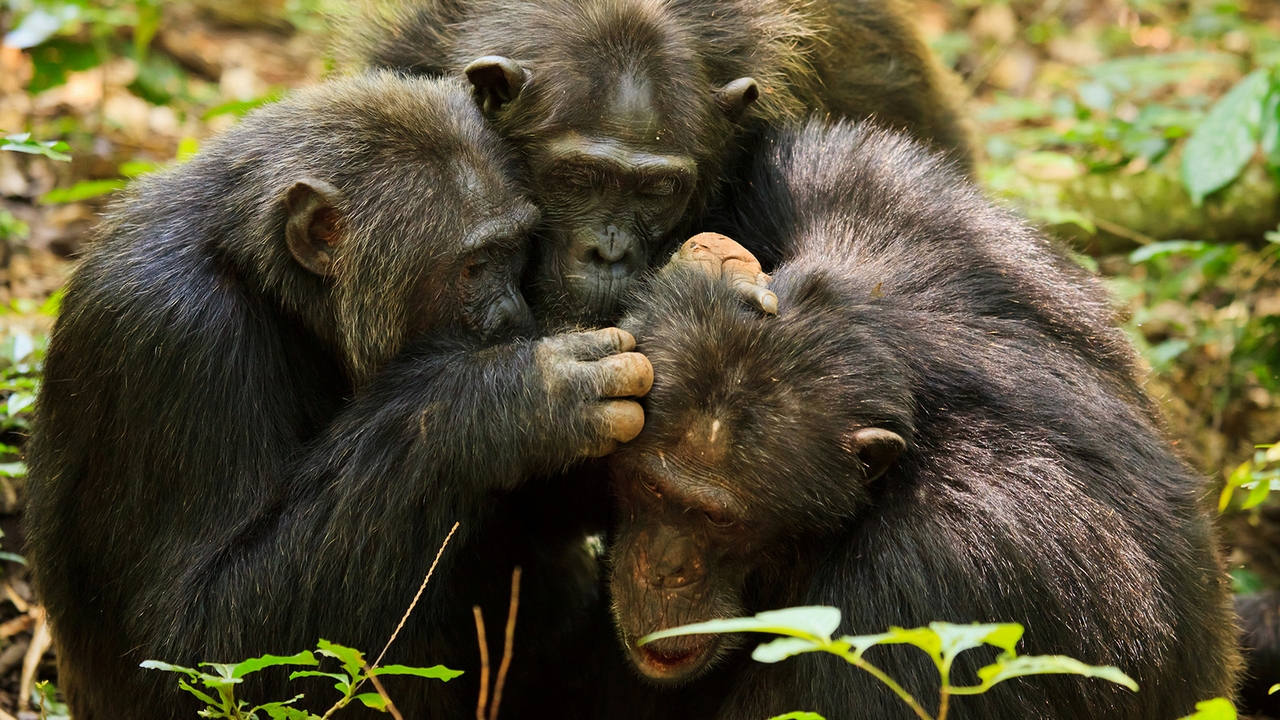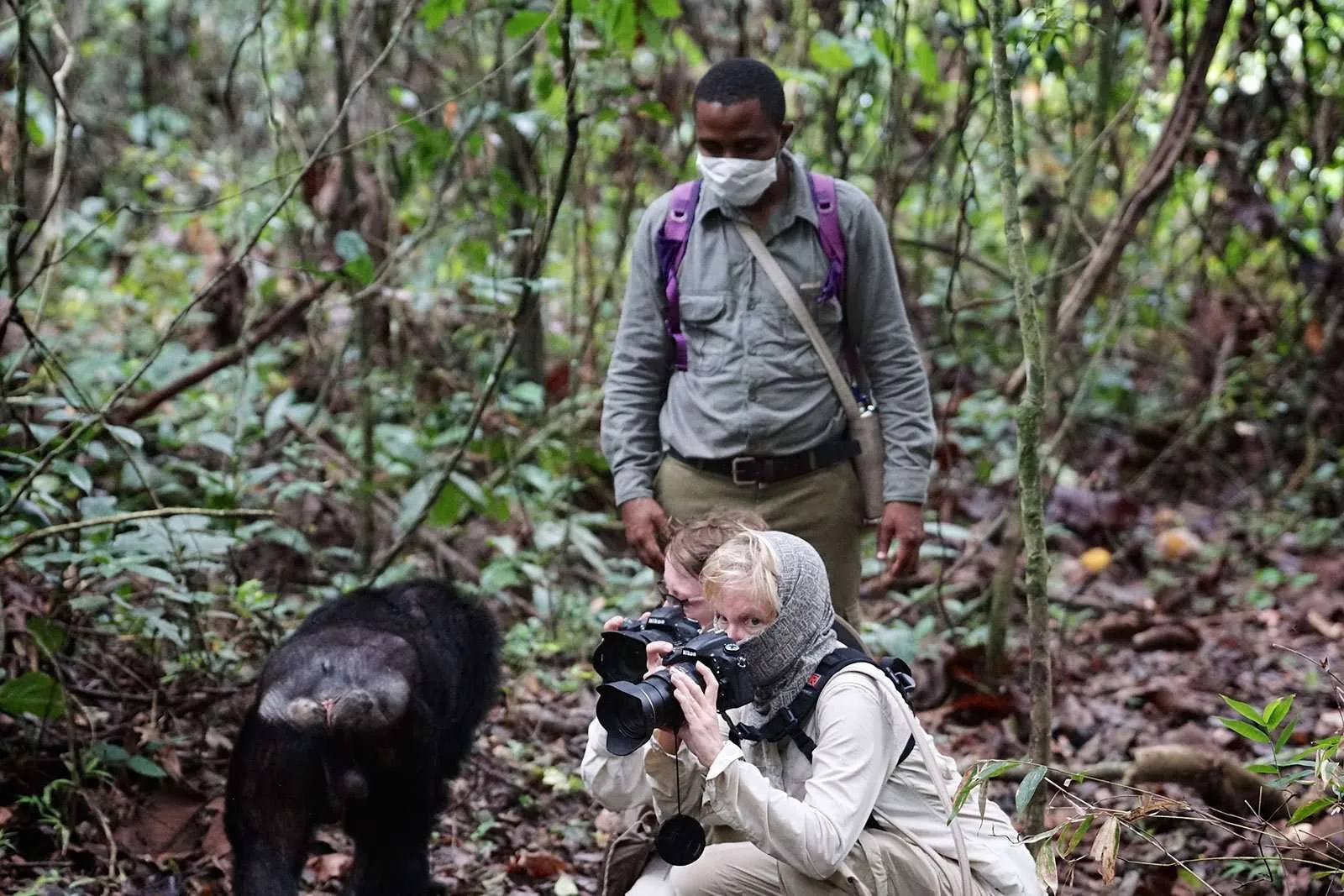One of the most iconic and powerful sights in the wild is a gorilla beating…
Chimpanzee Facts – Habitat, Diet, and Mating Behavior
Chimpanzees are our closest living relatives, sharing nearly 99% of human DNA. These intelligent and social primates are native to Africa and play a vital role in the ecosystems they inhabit. In this article, we dive into fascinating chimpanzee facts covering their habitat, diet, and mating behavior.

Where Do Chimpanzees Live?
Chimpanzees live in the tropical forests and savannahs of **Central and West Africa**. Their range includes countries like:
- Democratic Republic of the Congo
- Uganda
- Cameroon
- Nigeria
- Ivory Coast
- Gabon
They thrive in a variety of habitats, including:
- Rainforests
- Wooded savannas
- Montane forests
Chimpanzees build nests high in trees for sleeping and use these dense habitats as protection from predators and human disturbance.
Chimpanzee Diet – What Do Chimps Eat?
Chimpanzees are omnivores, meaning they eat both plant and animal matter. Their diet is extremely varied and changes with the seasons and availability of food.
Main components of their diet include:
- Fruits – their primary food source
- Leaves and stems
- Nuts and seeds
- Insects like termites and ants
- Meat – including small monkeys and bush pigs (rare but significant)
Chimpanzees have been observed using tools like sticks to extract termites or crack nuts, showcasing advanced problem-solving skills.

Mating Behavior and Social Structure
Chimpanzees live in fission-fusion societies, meaning group size and composition change frequently. Social bonds and mating are heavily influenced by dominance and hierarchy.
Chimpanzee Mating Facts:
- No fixed mating season – mating can happen year-round
- Females show sexual swelling to signal fertility
- Promiscuous mating system – females may mate with multiple males during one cycle
- Alpha males often have more mating success, but not exclusively
Mating is not just about reproduction. It also plays a role in social bonding and alliance-building within the group.
Chimpanzee Intelligence and Communication
Chimpanzees are highly intelligent. They use facial expressions, gestures, and vocalizations to communicate. Some have even been taught basic sign language in captivity.
They demonstrate behaviors once believed to be uniquely human, such as:
- Tool use and crafting
- Problem solving and planning
- Empathy and grief
- Political behavior (forming alliances and rivalries)
Conservation Status
Chimpanzees are currently listed as Endangered by the IUCN. Their population is declining due to:
- Habitat destruction
- Poaching and illegal pet trade
- Diseases such as Ebola and human-transmitted illnesses
Organizations like The Jane Goodall Institute and WWF work to protect chimpanzees through habitat preservation, education, and research.
Final Thoughts
Chimpanzees are more than just fascinating animals — they are complex, emotional, and vital to African biodiversity. From their adaptable diet to their social structures and mating behaviors, chimps continue to teach us more about ourselves. Understanding their needs and threats is key to ensuring their survival.

Chimpanzee Trekking in Uganda and Rwanda
For wildlife lovers and eco-tourists, chimpanzee trekking is one of the most immersive and unforgettable wildlife experiences in Africa. Unlike safaris in open vehicles, chimp trekking involves hiking through dense forests, tracking chimpanzee families with expert guides, and observing them in their natural habitat—just meters away.
Where to Go Chimpanzee Trekking
The best countries for chimpanzee trekking in Africa are Uganda and Rwanda, both offering world-class primate viewing experiences in protected rainforests.
📍 Uganda – Top Chimp Trekking Destinations
- Kibale National Park – Known as the “Primate Capital of the World,” home to over 1,500 chimpanzees. Offers the most reliable sightings.
- Budongo Forest Reserve – Located in Murchison Falls National Park, with experienced researchers and guides.
- Kyambura Gorge – A scenic “underground forest” in Queen Elizabeth National Park, though chimp sightings can be less consistent.
📍 Rwanda – Nyungwe Forest National Park
Located in southwestern Rwanda, Nyungwe Forest is a biodiverse mountain rainforest and home to about 500 chimpanzees. The trek is more challenging but rewards visitors with stunning views and rich birdlife along the way.
What to Expect During a Chimp Trek
- Early morning briefing and guided hike through forest trails
- Tracking based on vocalizations, nests, and ranger knowledge
- Once located, visitors spend up to 1 hour observing the chimps
- Group sizes limited to 6–8 people
- Moderate fitness required; terrain can be steep or muddy
Suggested Chimpanzee Trekking Tour Packages
Here are some sample tour itineraries that include chimpanzee trekking in Uganda and Rwanda:
- 3-Day Kibale Chimpanzee Trekking Safari – Uganda
Includes: Park entry fees, chimp permit, accommodation, transport from Entebbe or Kampala.
Request Quote - 6-Day Primates of Rwanda Safari – Nyungwe and Volcanoes NP
Includes: Chimp trekking in Nyungwe, golden monkey trek, and gorillas.
Request Quote - 7-Day Uganda Gorilla & Chimpanzee Adventure
Highlights: Gorilla trekking in Bwindi + chimpanzee tracking in Kibale + Big Five safari in Queen Elizabeth NP.
Request Quote
When Is the Best Time to Go Chimpanzee Trekking?
The best time for chimpanzee trekking is during the dry seasons:
- June to September
- December to February
During these months, trails are more accessible, and chimpanzees tend to stay closer to the ground in search of food and water.
Permit Costs (as of 2025)
- Uganda: $200–$250 USD per person (Kibale)
- Rwanda: $90–$100 USD per person (Nyungwe)
Note: Permits are required and should be booked in advance, especially during peak season.
Why Trekking Supports Conservation
Chimpanzee trekking not only provides a magical wildlife encounter—it also funds critical conservation work. Revenue from permits supports:
- Anti-poaching efforts
- Community education and development
- Habitat protection and reforestation
By choosing responsible tour operators and respecting guidelines during your trek, you directly contribute to the survival of chimpanzees in the wild.
Plan Your Chimpanzee Trekking Adventure
Whether you’re an eco-tourist, wildlife photographer, or primate enthusiast, chimpanzee trekking in Uganda or Rwanda is an experience like no other. Walk in the footsteps of Jane Goodall and meet these fascinating creatures face-to-face in their natural habitat. Just remember to bring your hiking boots, a curious mind—and a deep respect for the wild.



